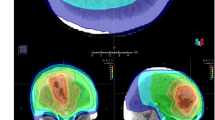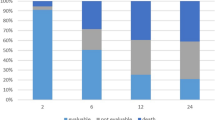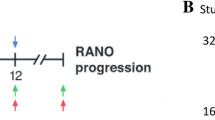Abstract
Radiotherapy, although clearly beneficial in patients with high-grade glioma, is largely palliative, and a protracted course of treatment may not be the most appropriate approach in the context of limited survival. We therefore assessed the feasibility, toxicity and survival results of a short accelerated radiotherapy regimen given twice daily over a period of 3 weeks. A total of 116 patients with high-grade glioma were treated with radiotherapy in a prospective study using an accelerated fractionation regimen. The total dose of 55 Gy was given in 32-36 fractions of 1.72-1.53 Gy, twice daily 5 days a week, with a minimum 6 h interval between fractions. Toxicity was assessed using Karnofsky performance status scale and in the later part of the study with the Barthel index. Survival data were compared with a control group treated with 60 Gy in 30 daily fractions in a previous MRC study, matched for known prognostic factors. The median survival of 116 patients treated with accelerated radiotherapy was 10 months. Survival comparison of accelerated patients with matched controls treated with conventional fractionation demonstrated a hazard ratio of 1.13 (95% confidence interval 0.85-1.51; P = 0.39). Early treatment toxicity was acceptable, with only seven patients developing transient decrease in performance status. The accelerated radiotherapy regimen was logistically feasible and acceptable to patients, carers and staff. Treatment time was reduced without apparent increase in early toxicity and there was no loss of survival benefit. The effectiveness and convenience of a short accelerated regimen makes this a suitable alternative to a 6 week course of radiotherapy in patients with high-grade glioma. However, a full randomised trial comparing conventional and accelerated radiotherapy may be required as proof of equivalence.
This is a preview of subscription content, access via your institution
Access options
Subscribe to this journal
Receive 24 print issues and online access
$259.00 per year
only $10.79 per issue
Buy this article
- Purchase on Springer Link
- Instant access to full article PDF
Prices may be subject to local taxes which are calculated during checkout
Similar content being viewed by others
Author information
Authors and Affiliations
Rights and permissions
About this article
Cite this article
Brada, M., Thomas, G., Elyan, S. et al. Improving the acceptability of high-dose radiotherapy by reducing the duration of treatment: accelerated radiotherapy in high-grade glioma. Br J Cancer 71, 1330–1334 (1995). https://doi.org/10.1038/bjc.1995.258
Issue Date:
DOI: https://doi.org/10.1038/bjc.1995.258
This article is cited by
-
Current perspectives in gliomas
Medical Oncology (1997)



